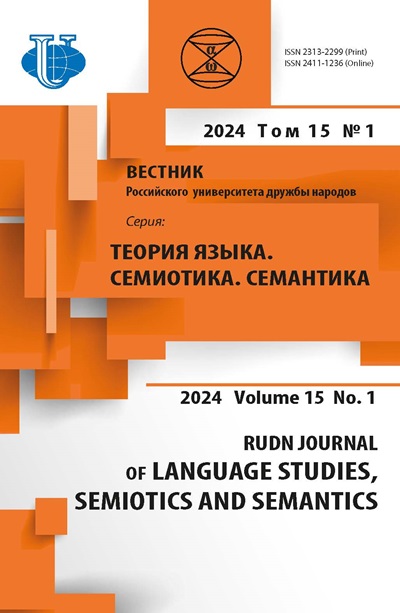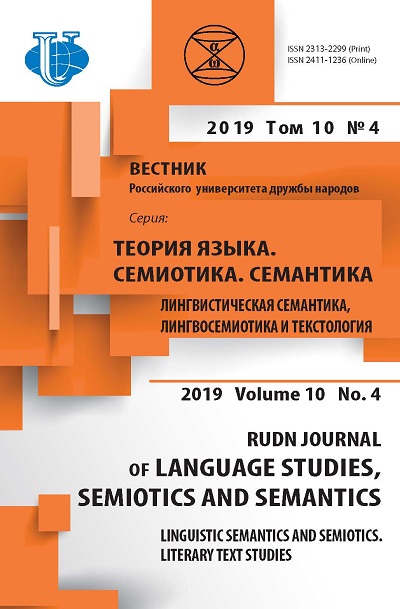Desacralization of the Word MAN in the Russian Language and its Spiritual Potential
- Authors: Baturina E.N.1
-
Affiliations:
- Office of the Governor and the Government of the Jewish Autonomous Region
- Issue: Vol 10, No 4 (2019): Linguistic Semantics and Semiotics. Literary Text Studies
- Pages: 828-840
- Section: FUNCTIONAL SEMANTICS
- URL: https://journals.rudn.ru/semiotics-semantics/article/view/22770
- DOI: https://doi.org/10.22363/2313-2299-2019-10-4-828-840
Cite item
Full Text
Abstract
The processes of desacralization and secularization, taking placein the Russian literary language over the three preceding centuries and nowadays, have caused significant changes in its lexical system. However, the language preserves lexical units with internal spiritual potential. They carry the genetic memory of the meanings of the past. One of these words, in our opinion, is the lexeme man . The article presents the results of analysing the semantic structure of the word man in the diachronic aspect. The analysis is based on the explanatory dictionaries of the Russian language, which include the vocabulary of different centuries, as well as etymological dictionaries. This study is carried out in order to reveal hidden sacral meanings in the semantics of the word. The method of generalization (unification) of dictionary definitions was used as the main research method. The lexical meanings of the word man were examined in different periods of its functioning, primarily in the language of the XIX-XX centuries. In our research, we based on the works of Russian linguists studying this problem. Sacred meanings in the semantic structure of the word man were revealed by comparing etymological and word-formation features of the lexemes man and people drawn upon minimal contexts from the texts of the Holy Scriptures. Despite the secularization of the semantic structure of the studied lexical unit, namely the actualization of the meaning of ‘personality as an exemplar of high moral and intellectual qualities’ and the loss of the meaning of ‘creature worthy of this name’, taking into account the degrees of humanity according to V.I. Dal such as‘a fleshy, deadman’, ‘aman of feelings and nature’, ‘a spiritual man’, ‘a blessed man’, it retained its spiritual potentialat the etymological level.
About the authors
Evgeniya N. Baturina
Office of the Governor and the Government of the Jewish Autonomous Region
Author for correspondence.
Email: murzilka240163@mail.ru
philosophy doctor, specialist-lingvist of office of the Governor and the Government of the Jewish Autonomous Region
60 years of the USSR Av., 18, Birobidzhan, Jewish Autonomous Region, Russian Federation, 679016References
- Valentinova, O.I. (2016). Archetypal signs of medieval theological text and their transformation, Voprosy kognitivnoy lingvistiki, 3, 109—118. (In Russ.).
- Kolesov, V.V. (2006). Russian mentality in language and text. St. Petersburg: Peterburgskoye Vostokovedeniye publ. (In Russ.).
- Valentinova, O.I., Denisenko, V.N., Preobrazhenskiy, S.Yu. & Rybakov, M.A. (2016). System view as the basis of philological thought. Moscow: Izdatel'skiy Dom YASK publ. (In Russ.).
- Kolesov, V.V. (2004). Word and deed: from the history of Russian words. St. Petersburg: Izdatel'stvo of St. Petersburg University publ. (In Russ.).
- Sreznevsky, I.I. (1958). Materials for the dictionary of the Old Russian language. Reprint. Moscow: Gosudarstvennoye izdatel'stvo natsional'nykh i inostrannykh slovarey publ. (In Russ.).
- Dictionary of the Russian Academy: Part VI is the last: from T to the end. In St. Petersburg at the Imperial Academy of sciences Russian 1794 publ. (In Russ.).
- Dictionary of the Russian Academy located in alphabetical order: Part VI: from C to the end In St. Petersburg at the Imperial Russian Academy in 1822 publ. (In Russ.).
- Dictionary of Church Slavonic and Russian language compiled by the Second division of the Imperial Academy of sciences. St. Petersburg. Typography of Imperial Academy of sciences 1847 publ. (In Russ.).
- Dal', V.I. (1995). Explanatory dictionary of living Great Russian language. In 4 vol. Moscow: TERRA publ. (In Russ.).
- Dictionary of language of Pushkin (1999). V.V. Vinogradov (Ed.). Moscow: Azbukovnik publ. (In Russ.).
- John Chrysostom, Saint. Conversations on the Genesis. URL: https://azbyka.ru/otechnik/ Ioann_Zlatoust/tolk_01/8 (accessed: 29.06.19). (In Russ.).
- Explanatory dictionary of Russian language (1996). D.N. Ushakov (Ed.). Moscow: TERRA publ. (In Russ.).
- Dictionary of modern Russian literary language (1965). In 17 vol. Vol. 17. Moscow: Izdatel'stvo Nauka publ. (In Russ.).
- Dictionary of Russian language (1999). Pod. red. A.P. Yevgen'yevoy. Moscow: Russ. yaz. Poligrafresursy publ. (In Russ.).
- Ozhegov, S.I. & Shvedova, N.Yu. (2006). Dictionary of Russian language. Moscow: OOO А Temp publ. (In Russ.).
- Efremova, T.F. (2001). New dictionary of Russian language. Moscow: Russ. yaz. publ. (In Russ.).
- Big еxplanatory dictionary of Russian language, (2000). S.A. Kuznetsov (Ed.). St. Petersburg: Norint publ. (In Russ.).
- Vinogradov, V.V. (1999). The history of words. Moscow: Institut russkogo yazyka RAN publ. (In Russ.).
- Serov, V.V. Encyclopedic Dictionary of winged words and expressions. URL: https://rus-wingwords-dict.slovaronline.com/3384-Человек%20-%20это%20звучит%20гордо (accessed: 12.11. 2019). (In Russ.).
- Gor'kiy, M. Stories, Essays, Memories In Collected works in 17 vol. Vol. 17. URL: https://ruslit.traumlibrary.net/book/gorkiy-pss30-17/gorkiy-pss30-17.html#work001 (accessed: 12.11. 2019). (In Russ.).
- Dostoevsky, F.M. (2004). Collected works. In 9 vol. Vol. 9. In 2 books by the Prince 2. Diary of the writer. Moscow: OOO Izdatel'stvo Astrel': OOO Izdatel'stvo AST publ. (In Russ.).
- Fasmer, M. (1987). Etymological dictionary of Russian language. In 4 vol. Vol. 4. Moscow: Progress publ. (In Russ.).
- Chernykh, P.Ya. (1999) Historical and etymological dictionary of modern Russian language. In 2 vol. Vol. 2. Moscow: Russ. yaz. publ. (In Russ.).
- Fasmer, M. (1987). Etymological dictionary of Russian language. In 4 vol. Vol. 2. Moscow: Progress publ. (In Russ.).
- Chernykh, P.Ya. (1999). Historical and etymological dictionary of modern Russian language. In 2 vol. Vol. 1. Moscow: Russ. yaz. publ. (In Russ.).
- Dictionary of Russian of the XI XVII centuries (1981). Iss. VIII. Moscow: Izdatel'stvo Nauka publ. (In Russ.).
- Dal', V.I., (2005). Proverbs of the Russian people. Moscow: Izdatel'stvo Exmo: Izdatel'stvo NNN publ. (In Russ.).
- Stepanov, Yu.S. (2004). Constants: Dictionary of the Russian culture. Moscow: Academicheskyi proyekt publ. (In Russ.).
- Bible (2009). Books of the Holy Scriptures of the Old and New Testaments. Canonical. With parallel seats. Moscow: Bibleyskaya liga publ. (In Russ.).
- Sacred Evngeliye (2016). On blessing of the most Saint Patriarch of Moscow and all Russia Kirill. Moscow: Sibirskay blagozvonnitsa publ. (In Russ.).













